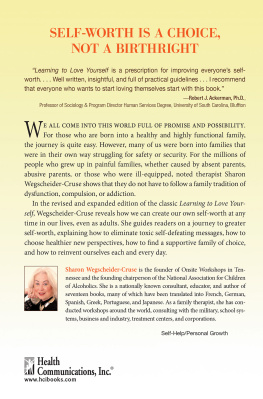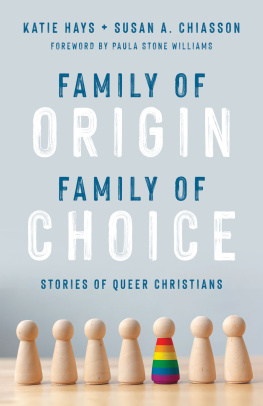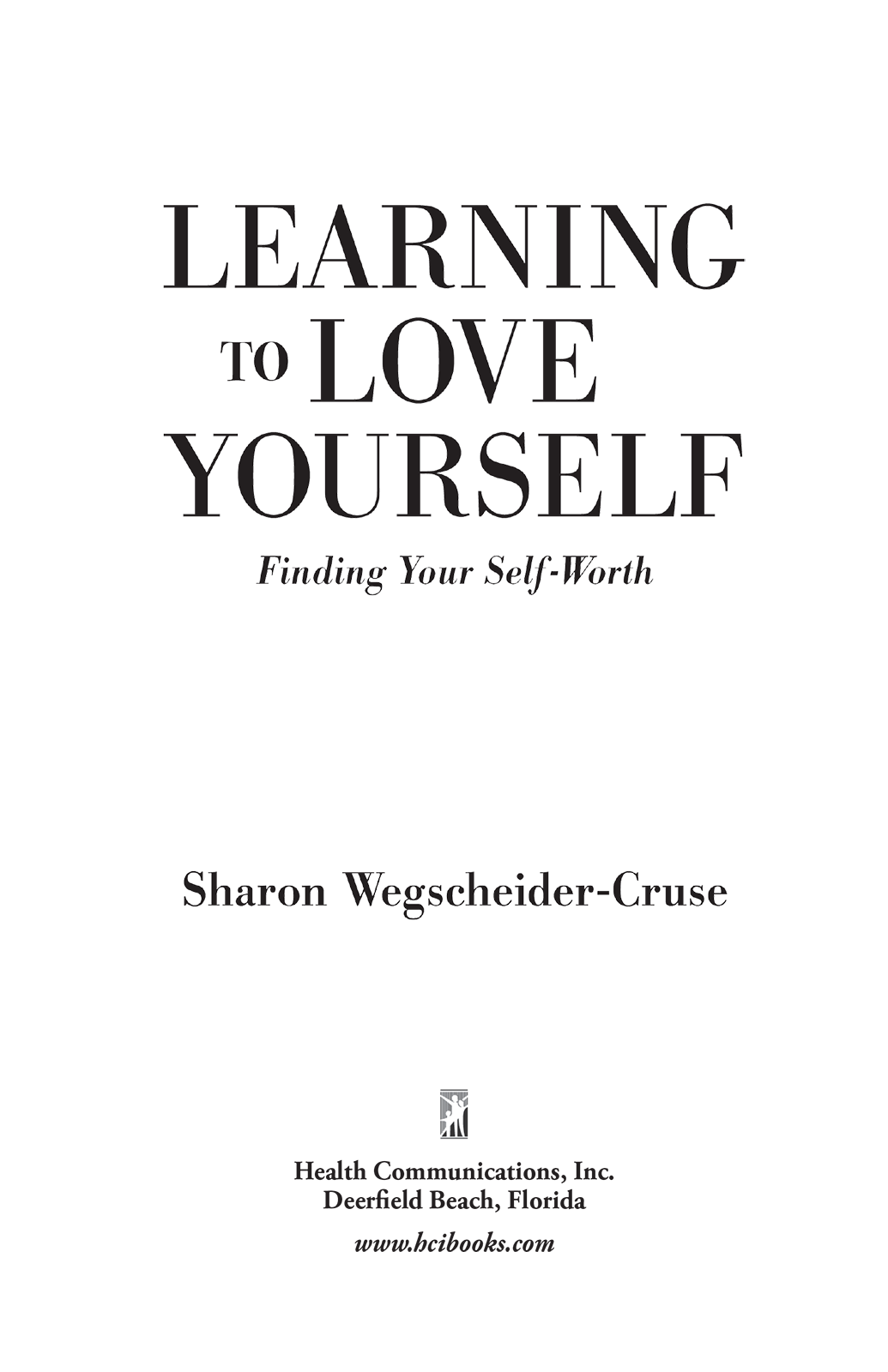Library of Congress Cataloging-in-Publication Data
Wegscheider-Cruse, Sharon, 1938
Learning to love yourself : finding your self-worth / Sharon Wegscheider-Cruse.Rev. & updated.
p. cm.
Includes bibliographical references. ISBN 978-0-7573-1615-9 (pbk.)
ISBN 0-7573-1615-8 (pbk.)
ISBN 978-0-7573-1616-6 (ebook)
ISBN 0-7573-1616-6 (ebook)
1. Self-esteem. I. Title.
BF697.5.S46W43 2012
158.1dc23
2012001839
2012 Sharon Wegscheider-Cruse
All rights reserved. Printed in the United States of America. No part of this publication may be reproduced, stored in a retrieval system, or transmitted in any form or by any means, electronic, mechanical, photocopying, recording, or otherwise, without the written permission of the publisher.
HCI, its logos, and marks are trademarks of Health Communications, Inc.
Publisher: Health Communications, Inc.
3201 S.W. 15th Street
Deerfield Beach, FL 334428190
Cover photo Dreamstime
Cover and interior designs by Lawna Patterson Oldfield
This book is dedicated to:
Myself and the courage it took
to claim my freedom
My childrenPatrick, Sandra, and Deborah,
who supported me and loved me through the most
difficult years of my life
Joe CruseHis challenge, love, and support
of me increases and embellishes my
self-worth on a daily basis.
Contents
Acknowledgments
The Team at Health Communications, Inc.
Every once in a while a professional relationship is so important that those involved are transformed. Thats how I see my relationship with your organization. Thanks for your role in bringing words of hope and help for a waiting and interested public.
Peter Vegso
Thank you, Peter Vegso, for continuing to believe in my writing and for bringing new information to your readers. Thank you for your vision and support.
Allison Janse
Thank you for helping me format and organize my material in a way that remains simple and useful to the reader.
Introduction
B eing asked to revise this book was a real treat. The belief that we are all worthy and much more empowered than we think we are is one I hold dear. We all come into this world full of promise and possibility, and then the journey to grow into our authentic selves begins. For some, when born into a healthy and highly functional family, the journey is quite easy, with guideposts and directions given freely, and with a practical and loving support system. However, my mentor, Virginia Satir, a well-known psychotherapist and author who is often referred to as the mother of family therapy, used to tell me that this population is a very small group of people. Most of us were born into families that were in their own way struggling for independence, accomplishment, safety, and security. There were varying abilities, resources, and skills. Some caretaking was superb, but oftentimes there were limits, difficulties, and a lack of time, energy, and know-how. As we navigated through the many hurdles and changes in life, we added toand sometimes took away fromour core of self-worth.
When I wrote the original edition of Learning to Love Yourself, I was actively working in the field of addiction with families of those who suffered from addiction (any kind of addiction). There was an explosion of helping professionals themselves who were the first to make the connection between coming from a painful family and facing consequences and challenges in their grown-up years. These early professionals led the way by seeking more for themselves and exploring their own lives. They then took what they had learned into their counseling sessions, wrote about it in their books, and used it in their own recoveries with the goal of helping all people find the link between their growing-up years and their self-worth.
The beauty of this early work (from 1970-85) is that we now know that all of us are impacted by our history, our environment, and our ability to make new and exciting choices in our lives. Today I awaken to a world of choices. I can choose to be wherever my life experience takes me, and I am free to reinvent myself with continued decisions. I can choose my behavior, and I am in charge of my own self-worth. I have choices, and I can change my mind (many times) and remind myself that I am the author of my life. I am the star in my story and the chairman of the board that is my life. Its up to me.
You, too, have this choice. By learning to love yourself, you can begin to put your hearts desires into action. You can choose to not procrastinate with your dreams. (Dreams will not go away anyway. They will only nag.) You can make a decision to change. If its the right decision, celebrate. If its the wrong decision and does not work out, then make another new decision. Either way, you have moved off dead center. Some decision is always better than no decision. When right decisions are made, the universe will support your decisions. When wrong decisions are made, things get harder and harder. Pay attention to the difficulties that you face and you will learn from them and find your path.
Continue to reinvent yourself as you change and grow. Dont let anyone ever tell you that you cant have it all. (Or worse, that you shouldnt strive to have it all.) You are a power-full person and just how powerful you want to be is up to you. Powerful people do not have power over, they have power from within.
I invite you to journey with me as you incorporate these new chapters into your life and bring yourself to where you want to be. Remember: Self-esteem is the combination of self-confidence (which comes from action and risk) and self-respect (which comes from effort and compassion for oneself).
CHAPTER ONE
Journey to Self-Worth
W hat actually is self-worth? Websters dictionary defines the word self-worth as ones worth as a person, as perceived by oneself. We can also take each word and understand each part.
self: personal; having its own identity; personality.
worth: deserving of value; useful.
The definition I would give to self-worth would be:
My valuable identity
Deserving all good things
How do we know when a person has positive self-esteem, self-worth, or feels good about themselves? Behavior is a good guide. Yet behavior can be deceptive, because its possible to act as if we have self-confidence, poise, and high self-esteem.
Theres an old saying: You cant tell a book by its cover. Similarly, we cant always tell whats going on inside a person who appears to be perfectly confident and self-assuredthe epitome of someone who has a high level of self-esteem. If we were to tune in on the thoughts of a person with a positive self-attitude, we might hear self-descriptive statements that sound like this:
I consider myself a valuable and important person, and I feel that Im at least as good as anyone else of my age and background. I think Ive earned the respect and consideration of my peers and coworkers. I sometimes have a positive influence on other people because I try to respect their feelings and dont run roughshod over them. I have a pretty definite idea of what is right, and Im able and willing to defend these views. At the same time, I feel that Im fairly flexible, and Im willing to listen to other points of view without feeling threatened and under attack. I enjoy new and challenging tasks and dont get upset when things dont turn out perfectly right away. I have patience.









